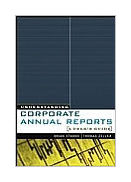|
||
• wydawnictwa polskie
• Zamów informacje o nowościach z wybranego tematu • kontakt
• Cookies na stronie |
UNDERSTANDING CORPORATE ANNUAL REPORTS. A USER'S GUIDESTANKO B., ZELLER Twydawnictwo: WILEY , rok wydania 2003, wydanie Icena netto: "As an employee
benefits consultant, I find an increasing need to examine and understand the financials of
my clients and prospects as well as the insurance companies that we represent. I found
this book valuable in understanding how to look into the annual statements to find the
information I need, and how to be aware of the numerous financial warning signs. The
material is well presented and easy to reference." "I found the format and
delivery very clean and straightforward. This is a wonderful blend of factual information
interwoven with savory, practical commentary. This book should be sold with post-it notes,
highlighters, and a red pen because any reader/user will want to go back often to utilize
the content. It may be more appropriate to refer to this publication as a map or a tool
because it guides the user to completion of a task that is usually more like a journey or
a project." "Understanding
Corporate Annual Reports: A User's Guide is a very valuable tool in helping to read
between the lines and build a better understanding of all the details contained in an
annual report. It is written using layman's terms and anecdotal evidence that make it
easy for the average investor to follow. This book will certainly help me become a more
knowledgeable and informed investor in the future." BRIAN STANKO, CPA, is Associate Professor of Accounting at Loyola University, Chicago. During the past ten years, he has taught in the undergraduate, graduate, and executive education programs as well as in the University's CPA Review Program. He has had articles appear in the Journal of Accounting and Public Policy, Corporate Controller, the CPA Journal, Journal of Applied Business Research, Healthcare Financial Management, Hospital Cost Management, and Journal of Business Ethics. THOMAS ZELLER, CPA, is Associate Professor of Accounting at Loyola University, Chicago. He has taught graduate and undergraduate courses in accounting and business strategy for more than ten years. He has had articles appear in Strategic Finance, Journal of Accounting and Public Policy, Corporate Controller, International Advances in Economic Research, Business and Economic Review, and Hospital Cost Management and Accounting. Table of Contents Preface. Acknowledgments. Chapter 1: FINANCIAL REPORTING AND THE ANNUAL REPORT. Corporate Annual Reports. Nature and Extent of the Corporate Annual Report. Responsibility for Content and Accuracy of the Corporate Annual Report. Current State of Financial Reporting. Earnings Pressure on Corporate America. Improving Financial Reporting. Education Is the Key. Notes. Chapter 2: STRUCTURE OF THE ANNUAL REPORT. Financial Highlights. Mission Statements, Corporate Profiles, and Statements of Corporate Values. Chairman's Message. Management's Discussion and Analysis. Report of Management. Independent Auditors' Report. Financial Statements and the Related Notes. Five- or Ten-Year Summary of Operating Results. Shareholder Information. Conclusion. Notes. Chapter 3: BALANCE SHEET. Importance of the Balance Sheet. Limitations of the Balance Sheet. Users of Balance Sheet Information. Classification of the Balance Sheet. Elements of the Balance Sheet. Conclusion. Notes. Chapter 4: INCOME STATEMENT. Importance of the Income Statement. Limitations of the Statement of Operations (Income Statement). Format of the Income Statement. Elements of The Home Depot's Statement of Earnings. Conclusion. Notes. Chapter 5: STATEMENT OF CASH FLOWS. SCF Concepts, Structure, and Terms. Detailed Look. Conclusion. Notes. Chapter 6: STATEMENT OF STOCKHOLDERS' EQUITY AND NOTES TO THE FINANCIAL STATEMENTS. Importance of the Statement of Stockholders' Equity. The Home Depot's Statement of Stockholders' Equity and Comprehensive Income. Notes to the Financial Statements. Conclusion. Notes. Chapter 7: ANALYSIS OF THE HOME DEPOT'S ANNUAL REPORT. Strategy, Tools, and Interpretation. Corporate Strategy Frameworks. Process to Identify The Home Depot's Corporate Strategy. Financial Analysis. The Home Depot Evaluation. Conclusion. Notes. Chapter 8: EMERGING ISSUES IN FINANCIAL REPORTING. Earnings Management. Pro Forma Reporting. Improving Financial Disclosure. Conclusion. Notes. Appendix A: REGULATORY ENVIRONMENT OF FINANCIAL REPORTING 207 Securities and Exchange Commission. Financial Accounting Standards Board. American Institute of Certified Public Accountants. Auditing Standards Board. Conclusion. Notes. Appendix B: BUILDING BLOCKS OF FINANCIAL REPORTING. Conceptual Framework. Conclusion. Notes. Appendix C: THE HOME DEPOT ANNUAL REPORT 2000. Index. 278 pages
Po otrzymaniu zamówienia poinformujemy, |


